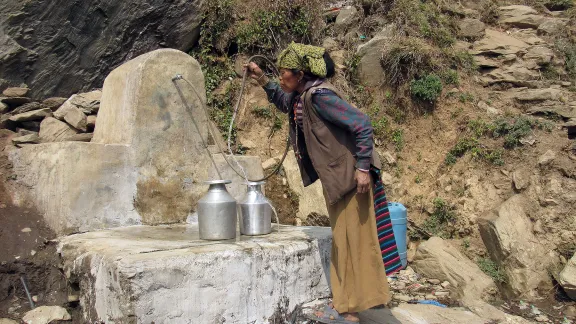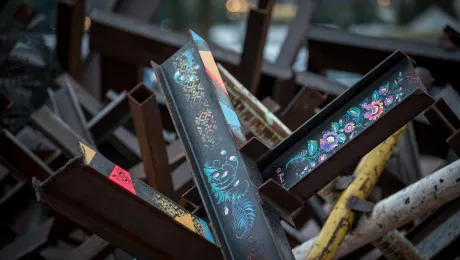
Thanks to collaboration between the LWF and IRW, locals have a fountain that provides safe drinking water. Photo: LWF/IRW
Earthquake-resilient buildings and sustainable livelihoods, thanks to the LWF and IRW
(LWI) – Women in Nepal’s Langbu village have gained both privacy and dignity with the public bathing cubicles built collaboratively by the Lutheran World Federation (LWF) Nepal and Islamic Relief Worldwide (IRW), following the devastating earthquake in 2015.
The women in my village feel their dignity has increased.
“With the previous public tap common for men and women, we could rarely bathe [properly]. These [new] cubicles give us the opportunity to take a full bath whenever we would like,” said Meena Ghale. For Maina BK, the washrooms have done more. “The women in my village feel their dignity has increased,” she added.
Thanks to the interfaith program Build Back Better (BBB) launched by the LWF and IRW to re-build community resilience after the earthquake, it is not only Ghale and Maina whose lives have improved. People with disabilities are among the many locals who now have earthquake-resilient houses, and skills training has created income-generating opportunities for many families.
The LWF and IRW began their collaborative efforts in Nepal immediately after the earthquake which killed 9,000 people, injured 22,000 and caused widespread damage. They focused on the rural municipalities of Naukunda and Kalika in the Himalayan district of Rasuwa, the smallest of the 16 districts in the region, with a population of 43,000.
By the end of last year, 151 houses had been constructed under the BBB initiative, which follows strict government guidelines under the supervision of qualified engineers and technical staff.

The Build Back Better initiative has provided 151 earthquake-resilient houses in the Himalayan district of Rasuwa. Photo: LWF/IRW
Gardening, tailoring, hairdressing and masonry
The project, which has been praised by both rural municipalities, supported 30 beneficiaries in developing vegetable gardens, another 21 people trained as tailors, hairdressers, plumbers and mobile phone repairers, and 120 persons trained as masons.
Five irrigation and six drinking water supply schemes were also set up as well as 2,042 temporary shelters, 241 inclusive toilets, four school toilets and two collection centers. Under BBB, the two municipalities established emergency funds and capacity was increased for 18 community-based and six school-based disaster management task forces.
Dr Prabin Manandhar, LWF Nepal country director, noted that the BBB project was well accepted by locals in a district inhabited by Buddhists and Hindus. “Interfaith harmony lies at the very foundation of human development, and it is part and parcel of the prevention of conflicts, resolution of conflict, and building peace for long-term development,” he emphasized.
Long-term social and economic capital
By increasing resilience, the BBB project has enhanced the social and economic capital in the communities. It focused on disaster risk reduction (DRR), promoting community recovery by ensuring compliance and monitoring. Gender equality and social inclusion were key aspects, Manandhar added.
In the remote rural municipalities of the mountainous and hard-to-reach district, promoting disaster risk reduction in the construction of homes, temporary shelters and other infrastructure projects has lowered the risk for future disasters.
Organizing and equipping the community with disaster preparedness skills, equipment and emergency funds has also strengthened local capacity to respond to similar disasters in the future. And, practical training of masons, farmers and other trades people has helped to develop the kind of resilience the communities need in the long term.

Skills training provides long-term economic solutions for people who lost nearly everything to the earthquake. Photo: LWF/IRW
A model for future disasters
The communities’ collaboration with the authorities has increased local ownership of the BBB project, while the development of skills to maintain the infrastructure and advocacy capacity have helped to ensure BBB’s sustainability.
And, there were initiatives begun by the locals themselves such as aicho-paicho (lending material or money to each other) and parma (helping neighbors) during the recovery phase, which increased trust, built strong relationships and helped in the psychosocial recovery.
We have enhanced skills to deal with any future disasters in our area. Moreover, collaboration of two faith-based organizations to support completely different faith-based communities is praiseworthy.
“We are encouraging the model of the project supported by LWF Nepal and IRW to other development partners. The community felt more powerful, capacitated and resilient after the project support,” said Nurbu Syangbo Ghale, chairperson of Naukunda Rural Municipality.
“We have enhanced skills to deal with any future disasters in our area. Moreover, collaboration of two faith-based organizations to support completely different faith-based communities is praiseworthy,” Ghale concluded.
Learn more about LWF's faith-sensitive approach in humanitarian response:
A contribution by LWF Nepal, edited by LWF Communications.


